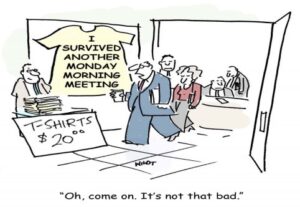 Become the fly on the wall at the Monday morning management meeting, and you will see the essence of any organisation. Research confirms our suspicions that most meetings are useless. In their survey, Wasting time at Work, salary.com revealed 47% of respondents rated “attending too many meetings” as their biggest time thief. Many of you will recognise the following:
Become the fly on the wall at the Monday morning management meeting, and you will see the essence of any organisation. Research confirms our suspicions that most meetings are useless. In their survey, Wasting time at Work, salary.com revealed 47% of respondents rated “attending too many meetings” as their biggest time thief. Many of you will recognise the following:
- The same two people are in the meeting room on time every week – everyone else arrives late.
- You’re not quite sure why Johnny is here.
- The agenda (assuming there is one) has been the same since 1999.
- Only Denise has read the minutes properly from last week, and that’s because she prepared them.
- The actions completed are the ones people were going to do anyway – everything else is carried over.
- The MD uses the forum to vent his spleen.
- The Sales Director hogs the rest of the time.
- You know Mark isn’t taking notes on his laptop – he’s sending emails, and Joan is texting under the table.
- The meeting lasts 3½ hours, at which stage you’ve lost the will to live.
Variations of these symptoms may seem familiar to you (and we’re not even touching on Zoom Fatigue, ‘death by PowerPoint’, company politics, interdepartmental rivalry, communication styles and personal agendas). Chances are, if you feel this way about your weekly management meeting, at least half of the other people agree with you (including your boss).
Doing something about it. You can address many of these issues by looking at the structure of the meeting itself.
- What is the purpose of the meeting? Is it a status update or a discussion forum? Does it solve problems or provide comfort to the MD that everyone knows what they’re doing? Perhaps there’s no need for the meeting at all. Effective meetings have only ONE purpose, (e.g. it’s either a status update OR a discussion forum).
- Make the meeting relevant by sticking to a sensible agenda, and having only required people in attendance.
- The person chairing the meeting should not take the minutes.
- STOP wasting time. If you are chairing the meeting, you can cut the waffle with a variation on “Thanks John, you’ve done a great job explaining your position, I’d like Peter to give his view of the situation”.
- Summarise – use dashboards or summary reports to provide the information to the group, since they can read, the talk should be about impact and options/recommendations. (You don’t need 20 minutes on the interesting conversation with your biggest target customer – all you need to know is:
- it took place
- we now understand who we need to talk to
- we’ve requested a meeting
- we will follow up to confirm the date by next week.
- Start and finish on time.
- Implement house rules on technology, i.e. phone calls, texts, emails – barring a national emergency, ban them from meetings. (Note to participants – we can still tell you’re doing it during a virtual meeting. Turning off your camera is as effective as using your hazard lights when double parked – you’re still disrupting everyone else.)
- Be clear on Next Steps – use action points, by whom, by when. Next week’s discussion is then about what happened, not a repeat of “what should we do?”
- Follow up is vital (see above). Focus on the Action Points, and take the minutes as read by circulating them shortly after the meeting takes place. That way, people have time to note their own actions, ask questions or raise issues.
Yes but…. If you’re nodding you head in agreement but don’t feel able to control the situation, what can you do? Remember the research? The others agree with you! Could you table a discussion about the meeting itself?
It can be tough changing ingrained behaviours, and may take a bit of time to bed in – but the payoff in terms of clarity, effectiveness and tension-reduction is well worth it.
Finally, if despite your efforts, no one else is willing to co-operate, forget the rest and focus on your own contribution to the meeting. In the words of Ryan Lilly, “Be a pro at what you do. No one shows-up to meetings of the Unsuccessful Skydivers Club.”
Dervilla O’Brien